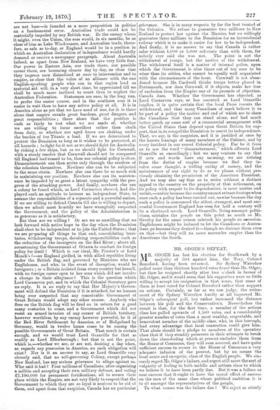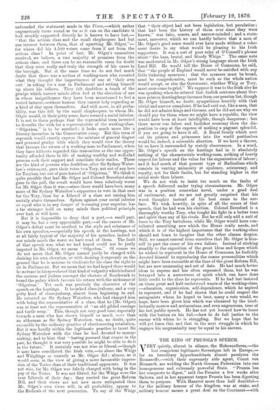MR. ODGER'S DEFEAT.
lit R. ODGER has lost his election for Southwark by a ill majority of 304 against him, the Tory, Colonel Beresford, having been returned. Sir Sydney Waterlow polled more than thirteen hundred votes fewer than Mr. Odger, but then he resigned shortly after two o'clock in favour of Mr. Odger, and it would seem that his supporters were so little willing to accept his resignation in that sense, that some of them at least voted for Colonel Beresforcl rather than support an artisan. Certainly, as far as we can judge, the retire- ment of Sir Sydney Waterlow hardly at all improved Mr. Odger's subsequent poll, but rather increased the distance between his poll and the Conservative's. Nevertheless the result is that, for the first time, a member of the artizan class has polled upwards of 4,500 votes, and a considerably greater number of votes than a most wealthy, respectable, and benevolent member of the middle-class, who, in this borough, had every advantage that local connection could give him. That alone should be a pledge to members of the operative class that if they steadily persevere in their attempts to break down the class-feeling which at present excludes them from the House of Commons, they will soon succeed, and have quite sufficient success to secure to the House of Commons a very adequate infusion of the poorest, but by no means the least acute and energetic, class of the English people. We sin- cerely regret Mr. Odger's failure, and regret still more the sort of vulgarity of feeling in both middle and artisan class to which we believe it to have been partly due. But it was a failure so near success that it ought to have the moral effect of success on the men of the same class whose political ambition it is to sit amongst the representatives of the people.
To what causes was the failure due ? We reject as utterly
unfounded the statement made in the Times,—which rather ungenerously turns round as far as it can on the candidate it had steadily supported directly he is known to have lost,— " that the artizan class and the small shopkeepers had but one interest between them, that of upsetting Mr. Odger,"- for where did his 4,500 voters come from if not from the artizan class ? In point of fact, Mr. Odger's committee received, we believe, a vast majority of promises from the artizan class, and there can be no reasonable room for doubt that they were really and truly the strength of his cause in the borough. But at the same time we do not feel much doubt that there was a section of working-men who resented what they thought the impertinence of one of their own sort' in asking for a seat in Parliament and setting himself up above his fellows. They felt doubtless a touch of the grudge which narrow minds often feel at the elevation of one in whose insignificance they have been accustomed to feel a vested interest,—whose honour they cannot help regarding as a kind of slur upon themselves. And still more, in all proba- bility, was this felt by the small shopkeepers, to whom Mr. Odger would, in their petty sense, have seemed a social inferior. It is not to them perhaps that the reproachful term invented to describe the wish for a representative of the working-class, " Odgerism," is to be ascribed ; it looks much more like a literary invention in the Conservative camp. But this term of reproach would exactly express the mixture of general disgust and personal grudge with which they would view the theory that favours the return of a working-man to Parliament, when they have hitherto regarded this transaction as the one oppor- tunity afforded them in life of making wealthy and well-clad persons seek their support and conciliate their smiles. These are the kind of persons who doubtless, after Sir Sydney Water- low's retirement, gave their votes to a Tory, not out of any love for Toryism, but out of pure hatred of "Odgerism." We think it quite possible that had Mr. Odger and Colonel Beresford alone gone to the poll, the result would have been relatively worse for Mr. Odger than it was,—since there would have been many more of Sir Sydney Waterlow's supporters to vote in that case for the Tory, than for a Liberal of a class not raising him socially above themselves. Spleen against your social inferior or equal who is in any danger of becoming your superior, has a far stronger hold on many minds than political principle ever had, or will have.
But it is impossible to deny that a part,—a small part, it may be, but a very appreciable part,—of the causes of Mr. Odger's defeat must be ascribed to the style and substance of his own speeches,—especially his speech at the hustings, not at all fairly typical of the majority of his speeches, indeed to our minds much the worst we have read of them. The fault of that speech was, what we had hoped could not be justly imputed to Mr. Odger, we mean " Odgerism." Of course we do not mean that Mr. Odger cannot justly be charged with desiring his own elevation, or with desiring it expressly on the ground that he is anxious to vindicate for his class the right to sit in Parliament. But we mean that we had hoped there would be no trace in his speeches of that kind of vulgarity which induced the envious and jealous amongst the electors of Southwark to brand the policy which favours his return with the nickname of Odgerism.' Yet such was precisely the character of the speech on the hustings. It breathed class-jealousy, and a very petty kind of class-jealousy, almost from beginning to end. He retorted on Sir Sydney Waterlow, who had charged him with being the representative of a class, that he (Mr. Odger) was at least not the representative of "an old gilded carriage and turtle soup." This, though not very good tone, especially towards a man who has shown himself so much more than an alderman as Sir Sydney Waterlow, was, no doubt, quite excusable by the ordinary practice of electioneering retaliation. But it was hardly within the legitimate practice to taunt Sir Sydney Waterlow with the time he had devoted to money- making, and to hint that "having pursued that course in the past, he thought it was very possible he might be able to do it in the future." It certainly was not wise or liberal,—though it may have conciliated the Irish vote,—to abuse the Whigs and Whiglings as coarsely as Mr. Odger did ; almost, as it would seem, in the view of giving a more favourable impres- sion of the Tories than of their traditional opponents. It was not wise, for Mr. Odger was falsely charged with being in the pay of the Tories. It was not liberal, for the Whigs were the true Liberals of their day ; they carried the great Reform Bill, and their views are not now more antiquated than Mr. Odger's own views will, in all probability, appear to
the Radicals of the next generation. To say of the Whigs military honour means a great deal on the Continent—with that "their object had not been legislation, but peculation ; that had been the history of them ever since they were known," was false, coarse, and narrow-minded ; and a state- ment, moreover, which we can hardly believe that a man of Mr. Odger's good sense would ever have made without a vehe- ment desire to say what would be pleasing to his Irish supporters. It was a sort of poor echo of O'Connell's phrase about" the base, brutal, and bloody Whigs." The same note was moderated in Mr. Odger's strong language about the Irish Land Bill. He would tell the House of Commons, he said, that "the people of England would never be satisfied with any little tinkering measures ; that the measure must be broad, must be comprehensive, must be such as the whole nation would accept, or else the Goverment, whether Whig or Tory, must soon come to grief." We suppose it was to the Irish also he was speaking when he uttered that foolish sentence about Ger- man princes drawinglarge incomes from our pension list, though Mr. Odger himself, no doubt, sympathizes heartily with that trivial and narrow complaint. If he had said out, like a man, that he did not admire kings and thrones, and he did not see why we should pay for them when we might have a republic, the view would have been at least intelligible, though dangerous ; but there never was falser and foolisher economy than the dis- position to carp at the expense of making a pageant splendid, if you are going to have it all. A Royal family which sent out its princes and princesses into the world portionless would be, indeed, a miserable abortion. If we have a throne, let us have it surrounded by stately observances. In a word, Mr. Odger's speech on the hustings had in it absolutely nothing of the characteristic working-man, nothing of hearty respect for labour and the value for the organization of labour ; and it had much of that poorest type of Radicalism which consists in venting animosity at opulence, aristocracy, and royalty, not for their faults, but for standing higher in the social scale than labour.
We do not wish to insist too much on the faults of a speech delivered under trying circumstances. Mr. Odger was in a position somewhat novel, under a good deal of excitement, and we are not greatly surprised that his worst thoughts instead of his best came to the sur- face. We wish heartily, in spite of all the errors of that speech, that he had won his election. Colonel Beresford is a thoroughly worthy Tory, who fought his fight in a better tone and spirit than any of his rivals. But he will only add a unit of force to the Tory battalions, while Mr. Odger would have con- tributed something new which the House really needs, and which it is of the highest importance that the working-class should not learn to imagine that the other classes despise. Still, we cannot conceal from ourselves that Mr. Odger is him- self in part the cause of his own failure. Instead of sticking steadily to the exposition of the great ideas and hopes which he wished to represent in the House of Commons, he foolishly devoted himself to reproducing the coarse personalities which might have been excusable at the time of the great Reform Bill, but are now unmeaning and out of date. He had much better ideas to express and has often expressed them, but he was betrayed into a narrowness of spirit which can have done little credit to the class he represents. If he had but insisted on those great and half-understood wants of the working-class, —education, organization, self-dependence, which he aspired to represent, and if he had shown that he could respect the antagonists whom he hoped to beat, many a vote would, we hope, have been given him which was alienated by the intel- lectually narrow and acrimonious, and even ungenerous, tone of his last public speech. He has not yet learned how-to fence with the button on his foil,—how to do full justice to the enemy with whom he is struggling. But we hope that he will yet learn this, and that in the next struggle in which he engages his magnanimity may be equal to his success.

































 Previous page
Previous page